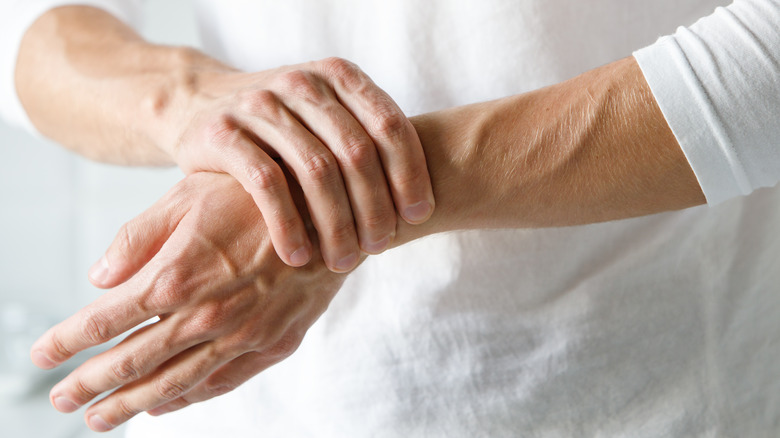Researchers Find Startling Link Between Cancer And Guillain-Barre Syndrome
Guillain-Barré syndrome (GBS) is a neurological autoimmune disorder that targets the healthy nerves residing outside of the brain and spinal cord (via National Institute of Neurological Disorders and Stroke). As a result of the nerve damage, those with GBS experience muscle weakness that makes movement difficult. While diagnosed predominantly in older adults, children can also be affected.
According to the National Institute of Neurological Disorders and Stroke, symptoms of GBS tend to progress in stages, most often beginning with a tingling sensation in the hands or feet, or pain in the legs or back. These initial sensations often subside as symptoms begin to progress into muscle weakness that may hinder one's ability to walk. Weakness is usually most severe in 90% of patients within three weeks. Additional symptoms may include difficulty swallowing or chewing, vision impairment, pain, unsteadiness, or issues with digestion or bladder control. In the most severe of cases, the nerve damage may impact one's ability to breath due to paralysis.
Affecting roughly 1 in 100,000 people annually, GBS is considered a rare disorder (per National Institute of Neurological Disorders and Stroke). However, a recent 2022 study shows that those with cancer may be at an increased risk for developing the condition.
The GBS and cancer connection
Published in the scientific journal Neurology, researchers conducted a study involving 2,414 people in Denmark who were "first-time hospital-diagnosed GBS" between the years of 1987 to 2016. Researchers discovered that 2% of those with GBS had been recently diagnosed with cancer. The study findings also indicated that those who had been recently diagnosed with cancer were over 3.5 times more likely to develop GBS than non-cancer patients (via HealthDay).
In addition, study findings showed that lymphomas and blood cancers, lung, prostate, and breast cancer put patients at a higher risk for developing GBS, with research showing the risk being between five to seven times higher (per HealthDay).
However, study author Dr. Lotte Sahin Levison explains via HealthDay that despite these numbers, the chances for developing GBS are still quite minimal, stating, "While our study suggests that people with cancer have a greater risk of developing Guillain-Barré syndrome, it is important that people with cancer know the overall risk of developing Guillain-Barré is still very small." According to the National Institute of Neurological Disorders and Stroke, regardless of the severity of the case, most GBS patients do recover, though some level of weakness may remain.


